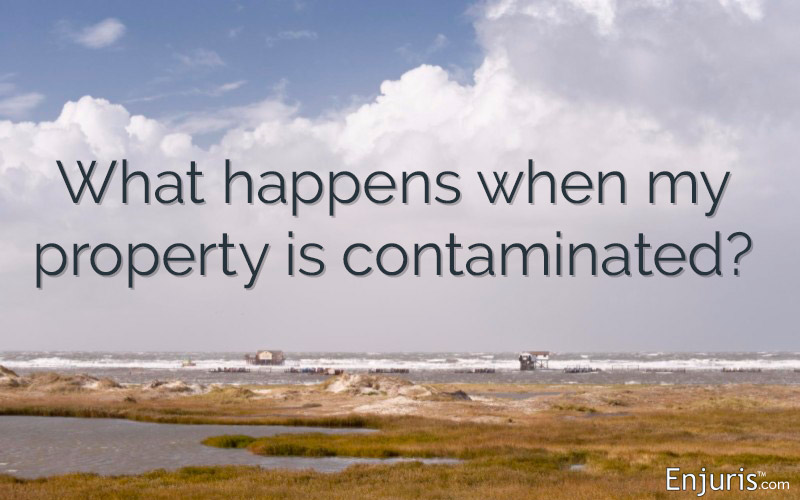
When can you sue for property contamination as a toxic tort?
You’ve probably heard about property being contaminated with a toxin, whether from the water, air or soil. The well-known Flint, Michigan water crisis is one example. In that case, people became ill from contaminated drinking water flowing from the taps in their homes. The city reduced contamination to mitigate the risks, but it still drastically decreased the value of their properties.
There are other scenarios, too. If you find that your home contains mold, asbestos, radon, or other substances, you might have a property contamination lawsuit on your hands.
In Georgia, property contamination could become a larger problem. In 2018, the federal government opened the offshore waters of the Georgia coast to seismic testing to expand oil and gas exploration. This leaves coastal residents open to the potential for disaster and environmental disturbance. Although the work is several miles away from coastal properties (or more if you’re farther inland), certain homeowners might still be at risk.
Seismic testing is a process used to determine where oil and gas is located in the ocean floor. When found, the sea bed is drilled to extract these resources. During the testing process, you might feel vibrations or hear the sounds of explosives if you’re close to the shore. There’s also the possibility of groundwater contamination from the chemicals used in the process.
And, if oil or gas is found, the offshore oil drilling begins. This is a very dangerous process, and it’s not unusual for oil drilling to result in explosions and oil spills. An oil spill would have a major environmental impact on a wide area of land and ocean. Humans experience a variety of medical issues, and your property might be contaminated as a result.
What is a toxic tort?
A tort is any kind of civil wrong. In other words, it’s a legal case (not criminal) in which a plaintiff (the injured party) sues a defendant (the party being sued) for a harm that could range from personal injury to corporate responsibility.
A civil court awards money to the plaintiff if it finds that the defendant was either negligent or caused intentional harm. The idea of tort law is that the plaintiff can become “whole,” or restored to their quality of life before the injury happened. A monetary settlement is designed to cover costs for medical treatment, lost wages, or other financial loss.
A toxic tort is personal injury or property devaluation caused by exposure to a substance like pesticide, hazardous waste, or other chemicals. A claim could be from:
- Exposure to radiation or radon gas
- Mold
- Pesticides
- Household chemicals like cleaning products
- Toxic substances on the job (asbestos, lead dust, and others)
- Contaminated groundwater or air
- Accidental chemical spills
- Toxic waste disposal
- Medical products or devices
- Chemicals in cosmetics or personal use items
What damages can I receive from a toxic tort case?
If your lawyer proves that your injury was caused by toxic contamination, you can receive compensation for:
- Medical treatment (both past and future treatment related to the injury)
- Property cleanup or remediation
- Costs for diminished property value
- Punitive damages (sometimes awarded to punish a defendant when the wrong was found to be willful or especially damaging)
It’s important to note that the presence of a toxin is not enough to bring a toxic tort claim. You also need to prove that you were harmed by exposure. Potential for harm isn’t enough, you need to prove that actual harm occurred in order to recover damages.
How property becomes contaminated: an example
Picture this:
You’re living the American Dream. You move out of your parents’ home, get a job, and decide to settle down. You use every penny of your savings and take out a mortgage to purchase a home for your family. Maybe you’re “house poor” for a while, but it’s worth it because you’re excited to live there for years—maybe decades.
And you do.
But then, one day you discover that your home is contaminated by something that can damage your health (maybe it already has), and it greatly diminishes the value of the property you’ve worked so hard to maintain. Perhaps your property was contaminated as the result of:
- An oil spill
- Improper disposal of chemicals or other waste
- Negligent drilling practices
- Leaking pipes or storage tanks
- Hydraulic fracturing (“fracking”)
Now, you’re in a bind.
You need to sell your home because you don’t want to be further exposed to toxins, but you can’t because no one wants to buy it for the same reason.
What to do if you’ve experienced a toxic tort
A toxic tort falls under the category of personal injury law, and it sometimes becomes a mass tort. A mass tort is similar to a class action because it involves several plaintiffs who join a case because they have the same cause of action and the same defendants.
Whether your lawyer is pursuing your claim individually or as a mass tort action, the following must be proven:
- The substance was dangerous or toxic
- The plaintiff was actually exposed to the substance
- The substance caused harm to the plaintiff
- Workplace/occupational exposure
- Home exposure
- Environmental exposure
- Pharmaceutical drug exposure
- Consumer product exposure
A toxic tort claim isn’t easy to prove, especially if exposure happened over a long period of time. You also have to show that any devaluation of your property is the direct result of the contamination and that the property value didn’t decrease for some unrelated reason.
You often need a team of environmental engineers, geologists, toxicologists, medical doctors, and a variety of other expert witnesses to show that your property was contaminated, how it was contaminated, and what needs to happen to remediate it.
That’s why hiring a Georgia personal injury lawyer is worth its weight in gold. A lawyer experienced in property contamination and toxic torts has built relationships with experts who are prepared to investigate and testify on your behalf. If you’re suing a large corporation, that company already has deep pockets and a team of lawyers on retainer. However, companies also don’t want the bad press involved in a lengthy court battle, so your lawyer can use that to your advantage.
Your lawyer will prove causation and fault in your toxic tort case, and then negotiate the amount of damages to which you are entitled.
See our guide Choosing a personal injury attorney.

